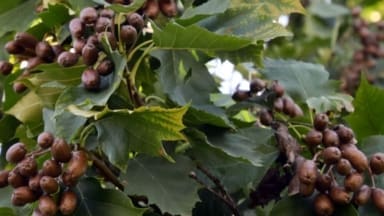
Only located in a few isolated locations across Denbighshire, the Sorbus torminalis, commonly known as the Wild Service tree, is part of a revival project to enrich the county’s native tree and plant populations.
The Local Nature Partnerships Cymru ENRaW project, funded by the Welsh Government, aims to restock lost species and boost populations to help slow, or turn the UK’s loss of biodiversity. The work involves the mapping of trees, and harvesting seed from ancient and veteran trees to ensure the survival of rare species, such as Sorbus torminalis.
At the council’s tree nursery, dozens of young specimens have been propagated and will eventually be planted out. The local tree nursery at Green Gates Farm, St Asaph, aims to produce 5,000 native wildflower plants a year alongside 5,000 native trees. Some of trees will be destined for a nature reserve being created on fields next to the nursery, whilst others will be planted in locations around the county.
Native to the UK and parts of Europe, Africa and Asia, Sorbus torminalis is a deciduous broadleaf tree, which can reach 25m when mature. The bark is brown and patterned with cracked, square plates, and the twigs are slender, shiny, grey-brown and straight. Rare and hard to find in the wild, it is found in oak and ash woods and pockets of ancient woodland. It grows best in clay and lime-based soils and remains a favourite for wildlife like the wood pigeon, whose gut softens its seeds for propagation. The edible fruit, which is reportedly similar in taste to dates, was historically enjoyed by children as sweets and also used to make a particular beer.
Liam Blazey, Senior Biodiversity Officer said: “We are really pleased that the facilities here at the tree nursery have been able to give such an historically recognised rare tree an important lifeline in our county. Thanks to all the attention poured into protecting the Wild Service Tree, we now have 240 trees all outside on the nursery grounds enjoying the warmer weather and growing well. Once they get to a certain stage we will look to get them out into the county to help boost numbers.”
Cllr Barry Mellor, Lead Member for Environment and Transport and Biodiversity Champion, said: “Our Biodiversity team is working hard to reduce the impact of climate change on our county lands which have unfortunately seen so many species become rare. This great effort will not only help nature recover but it will also give our future communities a slice of nature’s history back that they can get out into the outdoors to visit and enjoy for their own physical and mental wellbeing.”
For future reference, the Sorbus torminalis has been reclassified as Torminalis glaberrima.

